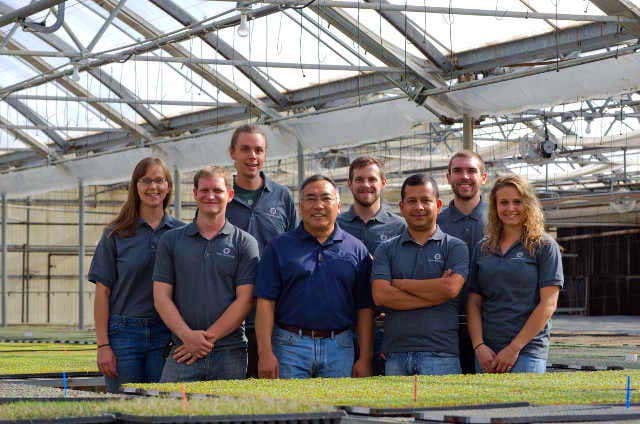

By: Tagawa Greenhouse Staff
July 1, 2020
In an effort to stay ahead of the curve, Tagawa Greenhouses is trying a new approach to how it runs its operation, starting with the production staff.
CEO Randy Tagawa says that throughout the greenhouse industry, customer expectations have increased, and the company wants to be accurate and provide customers with a quality product.
“On the young plant side, there’s definitely an expectation to have quality products delivered on time, and with the complexity of the number of varieties and product lines that we have, it’s definitely been challenging to provide and meet our customer’s expectations,” Tagawa says. “From a company standpoint, we’ve been trying to reinvent Tagawa’s. Just like any company and any product, you have to reinvent yourself to be relevant going into the future.
Making Changes To Keep Tagawa Current
Tagawa Greenhouses is a family owned company that has been in business for 47 years. The company produces young plants and liners sold exclusively to Ball Horticulture, as well as finished products for the mass market.
The company has locations in Brighton and Golden, Colo., and New Mexico, and each facility has around 16 to 20 acres of production greenhouses. Tagawa also has a partner company in California called Ball Tagawa Growers that produces all young plants that are sold to Ball.
To help meet customer expectation levels, the company has made an effort to build a great production staff. In the process of adding to the staff, many young individuals in their 20s and 30s were hired to fill those production spots.
Tagawa has found that younger individuals come to the table not only with an education, but with a lot of energy and a positive attitude. With more employees coming to the company with fewer years of experience, Tagawa says he is personally spending more time in production trying to educate growers.
“For the past six months, I’ve been directly working with all of our new production staff to help train them in making good production decisions,” he says. “I am very impressed with all of them and how fast they pick up on things.
Building A Strong Team
Hiring young people is one philosophy that is working for Tagawa Greenhouses. The production staff has improved in meeting its goals, and Tagawa says there is a lot more communication among staff members, and that the group is energetic, social and skilled at working as a team.
“I’ve seen a huge improvement over the past season and we will be very successful in meeting our customers’ expectations into the future,” Tagawa says.
There have been three new positions added to the production staff, for a total of 20 key production staff members. Eight of them are under 30 years old, which includes two of the three production managers.
All of these young people were some of the best graduates in the industry,” Tagawa says.
Along with those employees, there are many others under 30 who are playing key roles in the company, as well as many individuals over age 65 who offer the needed experience to make the company successful.
Blending experienced staff with talent from the younger generation has yielded positive results.
“This combination has started to come together and see success. I would say that this team is becoming the best in the industry,” Tagawa says.
“We hire just the best individuals. We’re not just concentrating our efforts on young people — it just happened on the production side that there was an opportunity to hire a lot of young people, so maybe we fell into it. It wasn’t a conscious effort; however, we do see the advantages in production.
One of the biggest challenges of hiring young employees is providing them with enough experience — not just in production techniques — but also in communications and working with people. Tagawa says that when hiring individuals who are just out of college, you must be willing to give them more responsibilities, despite their lack of experience.
On the other hand, Tagawa’s younger staff members are eager to learn and have a desire to do a good job.
“We have a couple of people under 30 in production manager roles, and we see them as up-and-coming individuals who can go really far within our industry,” he says.
Preparing New Growers For The Job
Company co-founder and now adviser Ken Tagawa always believed in training and having a great internship program for graduates who wanted experience, says Tagawa.
“I think that there are a lot of young people coming out of school who really don’t know what they want to do,” says Tagawa. “And as we look at it, we’re willing to do a lot of the training in order for them to be successful. It’s hard to try to find good people in any place. It doesn’t matter what age. Finding the talent to do production is difficult in itself, but as individuals are coming out of college, that’s an opportunity we’re tapping into.”
Whether a new employee is right out of school or not, Tagawa recommends putting them through a mini-internship program. New employees at Tagawa Greenhouses spend a few weeks learning about each of the company’s departments before they actually start working.
“It’s definitely advantageous to let people see your entire business, versus just putting them into their position and that’s all they do,” says Tagawa. “They should know something about your organization as far as marketing, merchandising, etc.”
That has been the company’s approach for its internship program, which has been in place for about eight years. Interns spend a semester working at Tagawa, during which they are exposed to all aspects of the organization.
“We go from one end of the business to the next. They spend some time in each to get a good understanding of what we’re doing,” Tagawa says.
Interns spend about a month and a half in production learning about decision making, watering, growing, spraying and all of the functions relative to growing. Then, they spend one to two weeks in each of the other departments in order to get a well-rounded view of what the company does. Interns are exposed to everything from maintenance to merchandising to finance to marketing.
One of the benefits of having the internship program is that it serves as a source for future employees. Some interns come from out of the country, or already have plans to work for their family’s businesses, but some are looking for jobs.
“That gives us an opportunity to look at them, and for them to look at us,” says Tagawa. “We might offer them a position if it works out for both parties.”



